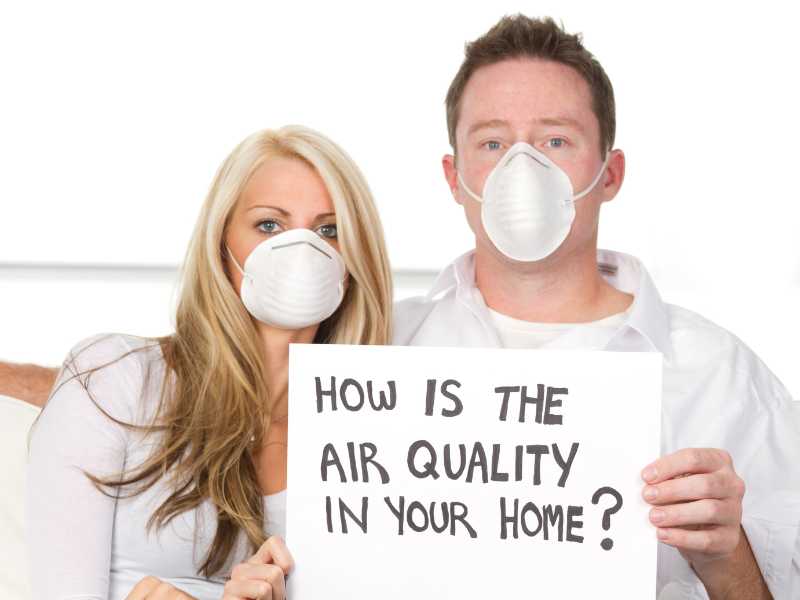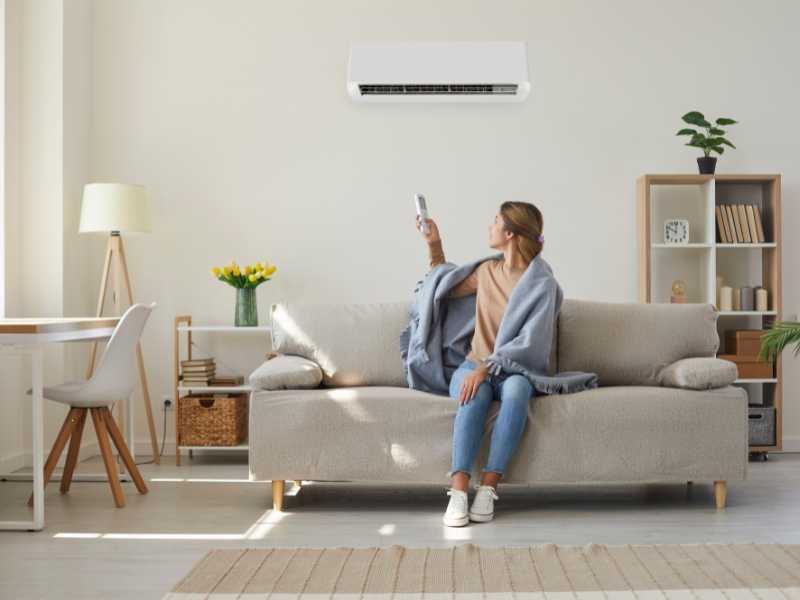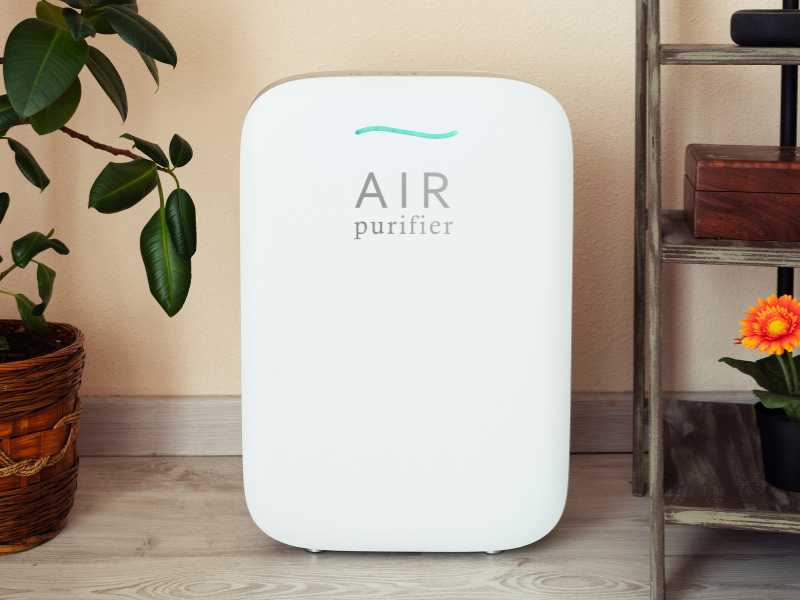How To Improve Indoor Air Quality: Indoor Air Quality Effects

What is air quality?
Air quality refers to the state of the air around us, particularly in terms of how clean or polluted it is. It is determined by the concentration of pollutants present in the air, which can originate from various sources both outdoors and indoors. Good air quality indicates a low level of pollutants, providing clean air that is safe to breathe. Conversely, poor air quality signifies a high level of pollutants, which can pose significant health risks and environmental problems.
How does air quality affect human health?
Air quality has a profound impact on human health, influencing everything from respiratory and cardiovascular systems to cognitive functions. Here’s how poor air quality can affect different aspects of health:
Respiratory Issues Like Asthma and Bronchitis
Exposure to air pollutants such as particulate matter (PM2.5 and PM10), nitrogen dioxide (NO2), and volatile organic compounds (VOCs) can lead to respiratory problems. Indoor air pollution, including mold spores, pet dander, and dust mites, often exacerbates conditions like asthma and bronchitis. These pollutants irritate the airways, causing inflammation, coughing, and difficulty breathing. Smoking indoors and the use of wood burning stoves also contribute to poor indoor air quality, further aggravating respiratory diseases.
Cardiovascular Diseases, Including Heart Attacks
Long-term exposure to poor air quality, especially high levels of particulate matter and nitrogen dioxide, is linked to cardiovascular diseases. Fine particles can penetrate deep into the lungs and enter the bloodstream, leading to inflammation and increased risk of heart attacks, strokes, and other cardiovascular conditions. Both outdoor air pollution from vehicle emissions and indoor sources like gas stoves contribute to these health risks.
Cognitive Impairments, Affecting Memory and Attention
Recent studies have shown that poor air quality can also affect cognitive functions. Exposure to high levels of air pollutants, particularly in urban areas with heavy traffic and industrial emissions, has been associated with cognitive impairments. These include reduced memory, attention, and overall cognitive performance. Indoor air pollutants, such as harmful chemicals from cleaning products and volatile organic compounds from paint stripping, can also impact cognitive health.
What are common pollutants that degrade air quality?
Air quality is degraded by a variety of pollutants, each originating from different sources and posing unique health risks. Some of the most common air pollutants include:
Particulate Matter (PM2.5 and PM10) from Combustion
Particulate matter, especially PM2.5 and PM10, consists of tiny particles that can penetrate the respiratory system. These particles come from combustion processes such as vehicle exhaust, industrial emissions, and wood-burning stoves. Fine particles (PM2.5) are particularly harmful as they can reach deep into the lungs and even enter the bloodstream.
Nitrogen Dioxide (NO2) from Vehicles and Power Plants
Nitrogen dioxide is a harmful gas produced by the combustion of fossil fuels, primarily from vehicles and power plants. High levels of NO2 contribute to respiratory problems, reducing lung function and increasing the risk of respiratory infections. This pollutant is a significant component of outdoor air pollution, particularly in urban areas with heavy traffic.
Sulfur Dioxide (SO2) from Industrial Processes
Sulfur dioxide is a gas produced by industrial processes, especially those involving the burning of coal and oil. Exposure to SO2 can cause respiratory issues, such as bronchoconstriction and increased asthma symptoms. It also contributes to the formation of acid rain, which can damage ecosystems and buildings.
Ozone (O3) at Ground Level is formed by Sunlight and Pollutants
Ground-level ozone is not emitted directly but is formed when sunlight reacts with pollutants like NO2 and volatile organic compounds (VOCs). This pollutant can cause respiratory problems, aggravate asthma, and reduce lung function. Ozone is a major component of smog, which is common in urban areas during sunny days.
Carbon Monoxide (CO) from Incomplete Combustion
Carbon monoxide is a colorless, odorless gas produced by the incomplete combustion of fossil fuels. It is commonly emitted from vehicles, gas stoves, and heating systems. High levels of CO can be deadly, as it prevents oxygen from entering the bloodstream, leading to symptoms such as headaches, dizziness, and, in severe cases, death.
How can poor air quality affect the environment?

Poor air quality not only affects human health but also has significant environmental impacts. Some of the key effects include:
Acid Rain Damaging Forests and Aquatic Habitats
Air pollutants like sulfur dioxide and nitrogen oxides contribute to the formation of acid rain. Acid rain can harm forests by leaching nutrients from the soil, damaging leaves, and making trees more susceptible to disease and harsh weather. It also affects aquatic habitats by acidifying water bodies, leading to the loss of fish and other aquatic life.
Eutrophication from Nitrogen Compounds, Harming Water Bodies
Nitrogen compounds from air pollution can lead to eutrophication in water bodies. This process involves the excessive growth of algae, which depletes oxygen levels in the water and harms aquatic life. Eutrophication can result in dead zones where aquatic organisms cannot survive, disrupting ecosystems and biodiversity.
Harm to Wildlife, Affecting Biodiversity and Ecosystems
Air pollution can harm wildlife directly through inhalation of pollutants and indirectly through changes to their habitats. Pollutants like heavy metals and persistent organic pollutants can accumulate in the food chain, affecting animals at all levels. This disruption can lead to decreased biodiversity and weakened ecosystems.
Climate Change, Contributing to Global Warming
Air pollutants such as carbon dioxide and methane contribute to climate change by trapping heat in the atmosphere. This global warming leads to extreme weather events, rising sea levels, and shifts in ecosystems. Reducing air pollution is essential for mitigating the effects of climate change and protecting the environment.
What are the sources of indoor air pollution?
Air pollution originates from various sources, both human-made and natural. Understanding these sources helps in identifying ways to reduce and manage air pollution effectively.
Industrial Emissions, Including Factories and Power Plants
Industries and power plants are major sources of air pollution. They release large amounts of pollutants, including sulfur dioxide (SO2), nitrogen oxides (NOx), and particulate matter (PM), through combustion processes and chemical reactions. These emissions contribute significantly to outdoor air pollution and degrade overall air quality.
Vehicle Emissions, Especially from Diesel Engines
Vehicles, particularly those with diesel engines, emit significant amounts of nitrogen dioxide (NO2), carbon monoxide (CO), and particulate matter (PM2.5 and PM10). These pollutants are major contributors to outdoor air pollution, especially in urban areas with heavy traffic. Vehicle emissions are a significant source of respiratory issues and other health hazards.
Agricultural Activities, Like Livestock and Fertilizer Use
Agriculture contributes to air pollution through livestock emissions and the use of fertilizers. Livestock produce methane (CH4) and ammonia (NH3), while fertilizers release nitrogen oxides (NOx) and other harmful chemicals into the atmosphere. These pollutants can lead to poor air quality and health impacts for nearby communities.
Natural Sources, Including Wildfires and Volcanoes
Natural events such as wildfires and volcanic eruptions release large amounts of pollutants, including carbon monoxide, particulate matter, and sulfur dioxide. While these sources are not as controllable as human-made sources, they significantly impact air quality, especially during active events.
How can individuals improve air quality?

Individuals play a crucial role in improving air quality by adopting various practices to reduce pollution both indoors and outdoors.
Reducing Energy Consumption in Homes and Offices
Lowering energy use helps reduce the demand for power, which in turn decreases emissions from power plants. Simple actions like turning off lights when not in use, using energy-efficient appliances, and optimizing heating and cooling systems can significantly impact overall air quality.
Using Public Transportation, Biking, or Walking
Reducing reliance on personal vehicles by using public transportation, biking, or walking can significantly cut down on vehicle emissions. These alternatives not only improve outdoor air quality but also promote healthier lifestyles and reduce traffic congestion.
Planting Trees and Supporting Green Spaces
Trees and green spaces act as natural air purifiers, absorbing carbon dioxide and releasing fresh air. Planting trees, maintaining gardens, and supporting urban green spaces can enhance air quality and provide environmental and aesthetic benefits.
What measures can governments take to improve air quality?

Governments can implement various policies and regulations to control and reduce air pollution, ensuring better air quality and public health.
Implementing Stricter Emission Standards for Industries
Governments can set stricter emission standards for industries to limit the release of harmful pollutants. Enforcing these standards ensures that factories and power plants use air cleaner technologies and practices to reduce their environmental impact.
Promoting Renewable Energy Sources, Like Wind and Solar
Transitioning to renewable energy sources such as wind and solar power helps reduce dependence on fossil fuels, thereby lowering emissions of pollutants like sulfur dioxide, nitrogen oxides, and carbon dioxide. Governments can incentivize the adoption of renewable energy through subsidies, tax breaks, and research funding.
Monitoring Air Quality and Public Health Impacts Systematically
Governments should establish comprehensive air quality monitoring systems to track pollution levels and their health impacts. This data can inform policy decisions and public health initiatives. Public awareness campaigns can educate citizens about the importance of air quality and encourage actions to reduce pollution.
Frequently Asked Questions About Air Quality
1. How can I improve indoor air quality in my home?
Improving indoor air quality can be achieved through several measures:
- Use an air purifier with HEPA filters to capture pollutants.
- Regularly change the air filter in your HVAC system.
- Add indoor plants that help purify the air.
- Ensure proper ventilation by opening windows when possible.
- Avoid using scented candles and air fresheners which can release other pollutants.
2. What are the benefits of using an air purifier?
An air purifier helps to:
- Reduce indoor air pollutants such as dust, pollen, and pet dander.
- Capture harmful particles with HEPA filters.
- Improve the overall quality of the air indoors.
- Alleviate allergy symptoms and reduce health risks.
3. How often should I change the air filter in my HVAC system?
The Environmental Protection Agency recommends changing your HVAC system’s air filter every 1-3 months, depending on usage and indoor air quality. Regular replacement helps maintain good quality in your home.
4. Are indoor plants effective in improving air quality?
Yes, indoor plants can help improve air quality by absorbing carbon dioxide and releasing oxygen. Some plants also remove harmful pollutants like formaldehyde and benzene, contributing to better air quality indoors.
5. How does air conditioning affect indoor air quality?
Air conditioning can improve indoor air quality by circulating and filtering air, reducing humidity, and removing pollutants. However, it is essential to maintain air conditioning systems by cleaning air ducts and replacing filters regularly to prevent the buildup of dust and mold.
6. What are the health risks associated with poor indoor air quality?
Poor indoor air quality can lead to various health effects, including:
- Respiratory issues such as asthma and bronchitis.
- Increased risk of lung cancer.
- Aggravated allergies and sinus problems.
- Higher susceptibility to infections, especially for older adults and children.
7. Can cooking fumes impact indoor air quality?
Yes, cooking fumes can significantly impact indoor air quality. Using natural gas or electric stoves can release pollutants. To minimize this, ensure proper ventilation by using exhaust fans and opening windows while cooking.
8. How can I reduce indoor air pollutants from cleaning supplies?
To reduce indoor air pollutants from cleaning supplies:
- Choose natural or non-toxic cleaning products.
- Use air purifiers to filter out chemical residues.
- Avoid using aerosol sprays and products with strong fragrances.
9. Why is ventilation important for indoor air quality?
Proper ventilation is crucial for maintaining good indoor air quality because it:
- Removes stale air and brings in fresh air.
- Reduces moisture levels, preventing mold growth in damp areas.
- Dilutes and disperses other pollutants such as cooking fumes and scented candles.
10. What role do HEPA filters play in air cleaners?
HEPA filters are essential components of air cleaners and air purifiers. They effectively capture 99.97% of airborne particles as small as 0.3 microns, including dust, pollen, mold spores, and pet dander. Using air purifiers with HEPA filters can significantly improve the quality of the air in your home.

Improve Your Indoor Air Quality with Callidus Air
Maintaining good indoor air quality is essential for a healthy living environment. Callidus Air offers expert HVAC services that ensure your home has the cleanest, healthiest air possible. From installing high-efficiency air purifiers to maintaining your HVAC system, Callidus Air has you covered. Our team serves Las Vegas, NV, and surrounding areas, providing top-notch services tailored to improve indoor air quality.
Contact Us Today!
